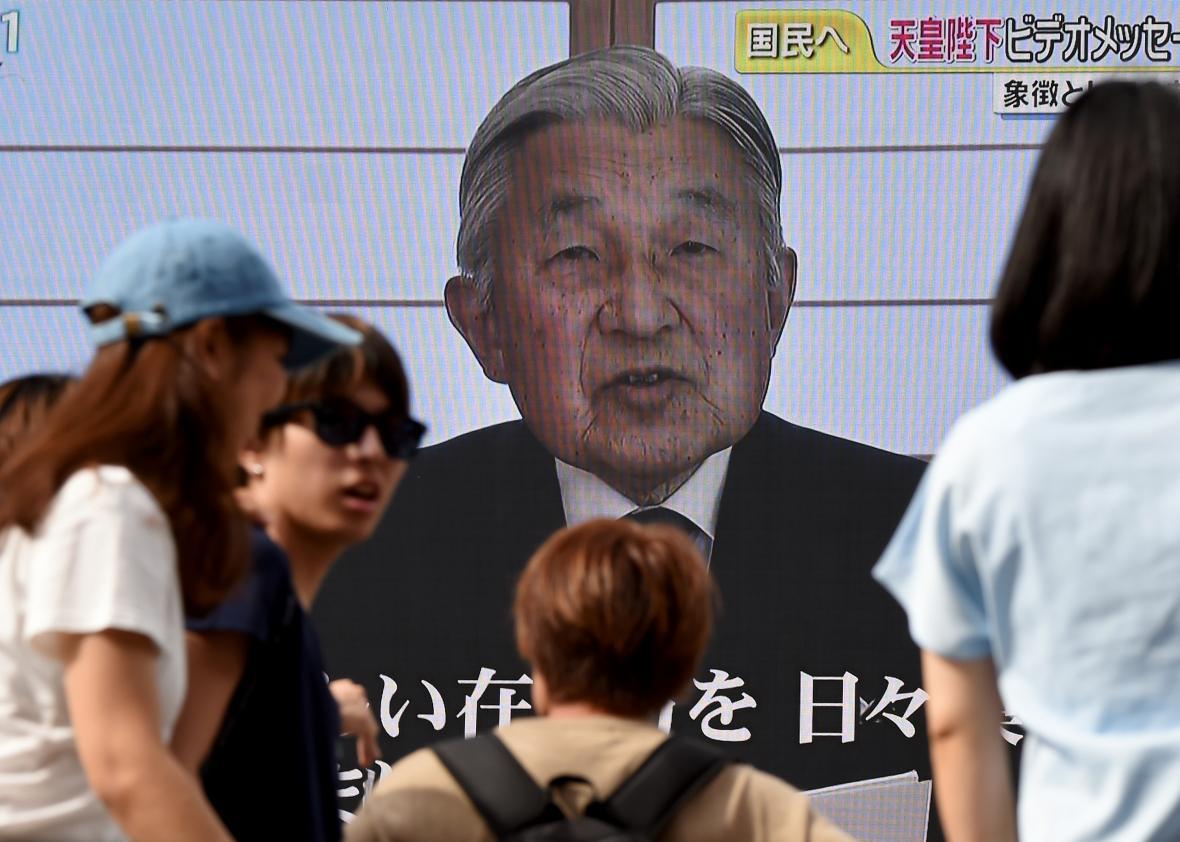The emperor of Japan wants to abdicate his throne for health reasons, but according to the country’s Constitution, he can’t even express that wish much less fulfill it.
Emperor Akihito, 82, spoke to the Japanese people in a nationally televised address for only the second time of his reign to indirectly make those sentiments clear on Monday.
“When I consider that my fitness level is gradually declining, I am worried that it may become difficult for me to carry out my duties as the symbol of the state with my whole being as I have done until now,” the man at the head of the world’s oldest continuous hereditary monarchy said during a 10-minute pre-taped address.
As the New York Times noted in this handy explainer on the history of Japan’s emperors, Akihito is the nation’s 125th emperor “in a line that extends back to the country’s founding in 600 B.C. by the Emperor Jimmu, who legend holds was descended from the sun goddess.” The Times reported that the evidence of a historical line for the first 25 emperors of Japan is shrouded in myth, but “there is ample historical proof of an unbroken hereditary line from A.D. 500 to today.” That’s between 1,500 and 2,600 years that his family has reigned for those of you doing the math.
Akihito’s role is entirely symbolic, but that symbol is one of the world’s oldest. When the United States wrote the Japanese constitution after the Second World War, it did not include a provision for abdication or—more controversially in recent Japanese history—for female heirs to take over the throne. Eight women had previously served as emperor. Also, the Constitution prevents the emperor from involving himself in politics in any way, which is why Akihito could not be explicit in requesting the legal change to allow him essentially to retire.
The last Japanese monarch to abdicate was Kokaku in 1817, and at the time he was the first emperor to last on the throne past the age of 40 in more than 200 years prior to that.
Akihito’s previous televised address to the nation was after the devastating 2011 earthquake and tsunami that killed more than 15,000 people. After the tsunami, he worked to help console the nation during one of the worst periods for Japan since the end of the war.
Akihito, who succeeded to the throne in 1989 when his father, Hirohito, died at the age of 87, was treated for prostate cancer in 2003 and had heart surgery in 2012.
As the Times reported, memories of his father’s last years of life appeared to be at play in the subtext of his speech:
He alluded to the last imperial transition nearly three decades ago. His father had intestinal cancer during the final years of his life, and his slow, painful decline was a focus of intense attention from the public and the news media.
Akihito said he wanted to avoid a situation where “society comes to a standstill” before his death, and the elaborate funeral rites required afterward distracted from the enthronement of his heir.
Prime Minister Shinzo Abe said he was carefully considering the possibility of changing the laws to allow Akihito to retire, but the Washington Post reported that the process for Parliament to amend the necessary law could take years.
“Considering his majesty’s age, the burden of his official duties and his anxieties, we must think carefully about what can be done,” Abe said.
According to the Post, between 77 and 90 percent of the Japanese public have told pollsters they’d be in favor of the government changing the laws to allow emperors to abdicate.
Next in line for the throne is Akihito’s oldest son, Naruhito, who is 56. Even if the law were to change, though, there would still be the controversial issue of the Constitution not allowing female heirs. There was a debate in 2005 over amending the law to allow a female emperor, but it was scuttled after the wife of Akihito’s second son gave birth to a boy. Naruhito has one child, a daughter, which means the current line of succession goes to him, then his brother Akishino, and then that nephew, Hisahito.
One more thing about the current emperor, from the Times: “Akihito is considered an expert on goby fish. Akihito has written 38 scientific articles on the fish, and a newly discovered species of the fish was named for him.”
Here’s hoping the man gets to spend more time on his goby fish in the not too distant future.
